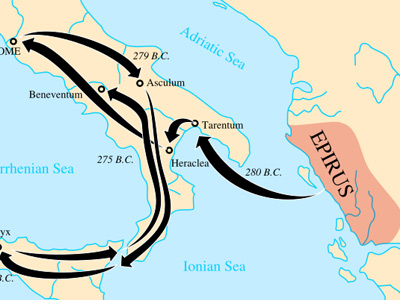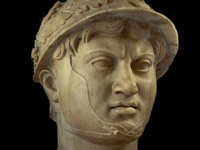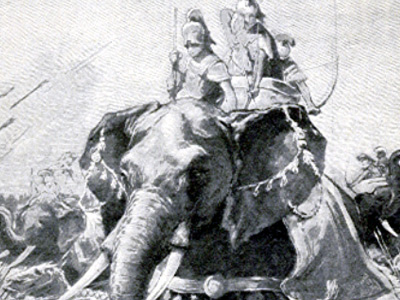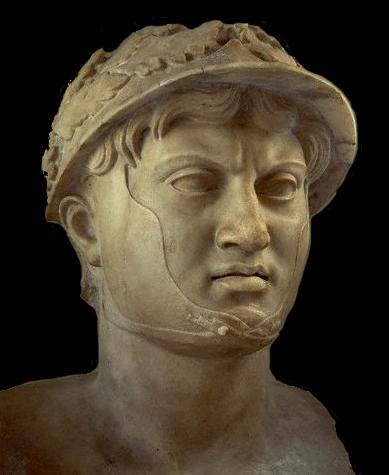Pyrrhic War (280–275 BC)

Tarentum asks Pyrrhus for Help
Dionysius of Halicarnassus wrote that the Tarentines decided to ask Pyrrhus to help them and banished those who were opposed to it. Prior to this, a Tarentine, Meton, pretended to be drunk to demonstrate the free and leisurely lifestyle of the Tarentines, argued against allowing a king to garrison the city and claimed that this would bring many evils to a free and democratic city like Tarentum. He was listened for a while, but then he was thrown out of the theatre where the assembly of the people had convened. Cassius Dio also related that Melton failed to persuade the Tarentines not to engage in war with the Romans The Roman Republic was a form of government of Rome and the era of the classical Roman civilization when it was run through public representation of the Roman people. Beginning with the overthrow of the Roman Kingdom (traditionally dated to 509 BC) and ending in 27 BC with the establishment of the Roman Empire, Rome's control rapidly expanded during this period - from the city's immediate surroundings to hegemony over the entire Mediterranean world. and that he argued that Tarentum would lose its freedom under Pyrrhus. Plutarch wrote that his words "brought conviction to most of the Tarentines, and a murmur of applause ran through the assembly. But those who were afraid that if peace were made they would be given up to the Romans, reviled the people for tamely submitting to such shameless treatment from a drunken reveller, and banding together they cast Meton out." After that a decree to send envoys from Tarentum and other Greek cities in Italy to Pyrrhus was passed. They brought gifts and claimed if he went to Italy he would find a force of 50,000 infantry and 20,000 cavalry gathered from Tarentum, Messapia, Lucania and Samnium. This got Pyrrhus excited and made the Epirotes eager to fight in Italy.
The Roman Republic was a form of government of Rome and the era of the classical Roman civilization when it was run through public representation of the Roman people. Beginning with the overthrow of the Roman Kingdom (traditionally dated to 509 BC) and ending in 27 BC with the establishment of the Roman Empire, Rome's control rapidly expanded during this period - from the city's immediate surroundings to hegemony over the entire Mediterranean world. and that he argued that Tarentum would lose its freedom under Pyrrhus. Plutarch wrote that his words "brought conviction to most of the Tarentines, and a murmur of applause ran through the assembly. But those who were afraid that if peace were made they would be given up to the Romans, reviled the people for tamely submitting to such shameless treatment from a drunken reveller, and banding together they cast Meton out." After that a decree to send envoys from Tarentum and other Greek cities in Italy to Pyrrhus was passed. They brought gifts and claimed if he went to Italy he would find a force of 50,000 infantry and 20,000 cavalry gathered from Tarentum, Messapia, Lucania and Samnium. This got Pyrrhus excited and made the Epirotes eager to fight in Italy.
Cassius Dio wrote that Pyrrhus "had a particularly high opinion of his powers because he was deemed by foreign nations a match for the Romans." He had for a long time coveted Sicily and considered how to overthrow Roman power, but he did not want to fight them "when no wrong had been done him." Both Cassius Dio and Plutarch wrote about Cineas, an important adviser of Pyrrhus. He was a man from Thessaly with a reputation for great wisdom who had been a pupil of Demosthenes the orator. Pyrrhus held him in high regard. Cineas saw the folly of an expedition to Italy. He tried to dissuade Pyrrhus and urged him to be satisfied with the possessions he already had, but Pyrrhus did not listen to him.
Pyrrhus asked Antiochus I (the king of the Seleucid Empire) for money and Antigonus II (the king of Macedon) to lend him ships to carry his army to Italy. Ptolemy II (the king of the Ptolemaic Kingdom in Egypt) gave him 5,000 infantry and 2,000 cavalry on condition that they would not serve him for more than two years. In exchange, since Pyrrhus would be taking the best of his army to Italy, he appointed Ptolemy as guardian of his kingdom while he was away.
Zonaras wrote that Pyrrhus, who saw the request for help as a lucky break for his aims in Italy, insisted on a clause in the treaty with the Tarentines which provided that he should not be detained in Italy longer than needed in order not to arouse suspicions. After that he detained most of the Tarentine envoys as hostages with the excuse that he needed them to help him to get his army ready. He sent a few of them ahead with Cineas who was given some troops. This came in the way of negotiations with the Romans. He arrived soon after the election of Agis and his arrival encouraged the Tarentines, who stopped their attempts at reconciliation with the Romans. They deposed Agis and elected one of the envoys as commander. Shortly after this Pyrrhus sent Milo, one of his lieutenants, ahead with another force. He took the acropolis to serve as headquarters for Pyrrhus and took over the guarding of the wall. The Tarentines were happy to be relieved from this task, gave food to the troops and sent money to Pyrrhus. Plutarch wrote that Cineas went to Tarentum with 3,000 soldiers.
Lucius Aemilius saw that the soldiers of Pyrrhus arrived and could not hold out because it was winter. He set off for Apulia. He was ambushed by the Tarentines at a narrow pass. However, he put some captives in front and they stopped the attack because they did not want to hurt their compatriots.
Zonaras wrote that Pyrrhus did not even wait for the spring to cross the sea to reach Italy (the Mediterranean Sea is stormy in the winter). He was caught in a storm. He lost many men and the rest was scattered by the sea. He reached Tarentum overland with difficulty. Plutarch wrote that after many ships were sent from Tarentum, 20,000 infantry, 2,000 archers, 500 slingers, 3,000 cavalry, and twenty elephants were embarked. When the fleet was caught in the storm some ships missed Italy and ended up in the seas of Sicily and Africa. Others were swept to other shores and were destroyed. Pyrrhus threw himself into the sea and managed to reach the coast. He was helped by the Messapii. Some of the ships survived the storm. Only 2,000 infantry, a few cavalry and two elephants reached Italy.
Pyrrhus did not do anything against the will of the Tarentines and did not impose anything on them until the surviving ships arrived and he assembled most of his forces. After that he put restrictions on the inhabitants because they were only interested in a leisurely lifestyle and would have let him do all the fighting. He closed all the gymnasia, banned festivals, banquets, revelry and drinking. He closed the theatre in case the people gathered there for a revolt. He feared that the people, feeling oppressed, might defect to the Romans. Therefore, he sent men who could be able politicians to Epirus and assassinated some of them. He ordered that the citizens undergo severe military exercise or face a penalty and put the men of military age into military service along his soldiers, dividing them into two companies. Zonaras also wrote that Pyrrhus placed guards in people's houses so that they would not leave the city. The Tarentines felt that they found in Pyrrhus a master instead of an ally. Some people complained and left the ranks. Plutarch wrote: "Many therefore left the city, since they were not accustomed to being under orders, and called it servitude not to live as they pleased." Appian wrote that the penalty for not undergoing severe military excercises was death; the "king's officers [ ] quartered themselves upon the citizens by force, and openly abused their wives and children. . . . [M]any people . . . fled the city as though it were a foreign government and took refuge in the fields, . . .[and] Pyrrhus . . . closed the [city] gates and placed guards over them."
The Greek city of Rhegium, in Calabria, on the Strait of Messina, asked the Romans for a garrison. The Romans sent a contingent of 4,000 men to the city. At first they honoured their duty. However, With the Romans being busy with dealing with Tarentum and Pyrrhus, this contingent was not under strict discipline and, instigated by Decius, their commander, they coveted the riches of the city. They were inspired by the Mamertines, mercenaries who had been placed to garrison the city of Messana (in Sicily, on the other side of the narrow Strait of Messina) by Agathocles of Syracuse and seized the city, killing its male inhabitants, when he died in 289 BC. Decius presented letters which he claimed were written to Pyrrhus by some citizens who wanted to betray the city to him. He also got a man to announce that part of Pyrrhus’ fleet was anchored nearby. This provided a pretext from seizing the city. Many people were killed. Decius then ratified a friendship with the Mamertines. The Romans did not react immediately because they were busy dealing with Pyrrhus. They were reproached because they did not seem to give this matter great importance. During his second consulship in 278 BC, after Pyrrhus went to Sicily, Gaius Fabricius Luscinus was sent to Rhegium. He besieged the city and seized it. The surviving rebels were sent to Rome, where they were beaten with rods and executed for treason, their bodies cast away unburied. Decius committed suicide.
HISTORY

RESOURCES
This article uses material from the Wikipedia article "Pyrrhic War", which is released under the Creative Commons Attribution-Share-Alike License 3.0.
© Stories Preschool. All Rights Reserved.










